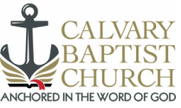What Does it mean to be A Baptist Church?
There is Understandable Confusion
There is a good deal of confusion in our day concerning the name Baptist. Some misunderstand the historical background of Baptists. There are those who mistakenly connect Baptists with John the Baptist of the Gospels. Some misunderstand the theology of Baptists. Not all Baptist churches believe the exact same doctrine. Some people make the mistaken assumption that all Baptists are the same in practice. ("You've seen one, you've seen 'em all.") There have been Northern Baptists, Southern Baptists, American Baptists, Independent Baptists, Primitive Baptists, Reformed Baptists, Free Will Baptists, and Regular Baptists (to name a few).
One attempt at Clarification
In the items below we will attempt to clarify what it means to be a Baptist church. Years ago, someone developed an acrostic that helpfully summarizes the basic principles that distinguish Baptist churches from other Christian churches. While we do find this acrostic helpful, we have chosen to utilize a useful summary of six principles written by Dr. Kevin Bauder in his book, Baptist Distinctives and New Testament Church Order.
1. Authority of the New TestamentThe Bible is to be the only authority for both what we believe and what we practice. While recognizing the absolute authority of all of God's Word, the primary authority for churches is to be found in the New Testament. As Baptists, we believe in the authority and sufficiency of God's Word. There is no human authority over a local church that would take the place of God and His Word. Each congregation is free to follow the dictates of its collective conscience as informed by and conformed to God's Word.
4. Individual Christian ResponsibilityBaptists have traditionally held to the position that no one stands between an individual and his/her God, or between an individual and his/her Bible. Sometimes this is called the individual priesthood of believers. Some may refer to this as individual soul liberty. This emphasizes that each individual has the responsibility for their own spiritual growth, as well as the competence to do so as enabled by the Holy Spirit.
|
2. Believer BaptismBaptist are perhaps best known for practicing baptism of professing believers only by immersing the candidate in water. Who we baptize, why we baptize, and how we baptize are important to us. Baptists do not believe that infants should be immersed or sprinkled or poured. Immersion is reserved for those who make a credible, public profession of faith in Jesus Christ, indicating their willingness to be obedient to Him. The only method of baptism recorded in the New Testament is immersion.
5. Congregational GovernmentWhile Baptists have always had pastors or elders, these leading officers are not the final authority within a church. The principle of elder-led, congregation-ruled is to be preferred to being elder-ruled. We do not believe the congregation is a simple democracy or that the simple majority is always right. Churches make mistakes, and at times make the wrong decisions. Pastors are to lovingly lead and encourage the congregation to make decisions based on Biblical principles. Deacons are to humble serve the congregation as directed by the congregation and the pastor.
|
3. Pure Church MembershipBaptist hold to the position that church membership should be limited to those who give a credible profession to be a believer. Some refer to this as regenerate church membership. We also recognize that just because someone claims to be a follower of Jesus Christ, this does not guarantee that he/she genuinely is. Thus, we practice church discipline, emphasizing both the responsibility of the individual to the congregation, and the congregation's responsibility to the individual.
6. Separation of Church and StateBaptists have historically held to the separation of church and state, recognizing that God has granted to each of these institutions its own realm of authority. They should not be mixed. Baptists recognize that while the government has no authority over any person's conscience, Christians are called to submit to the just laws of this God-ordained institution. When the laws of government clearly contradict the revealed will of God, Christians are free to obey God rather than man.
|
We at Calvary Baptist Church in Sleepy Eye would align mostly with the tradition of the Particular Baptists, which originated in England in the mid-1600's. A helpful explanation of this background is found in Michael Haykin's book, Kiffin, Knollys, and Keach--Rediscovering Our English Baptist Heritage. We align ourselves with the Minnesota Baptist Association and the Minnesota Association of Regular Baptist Churches.
